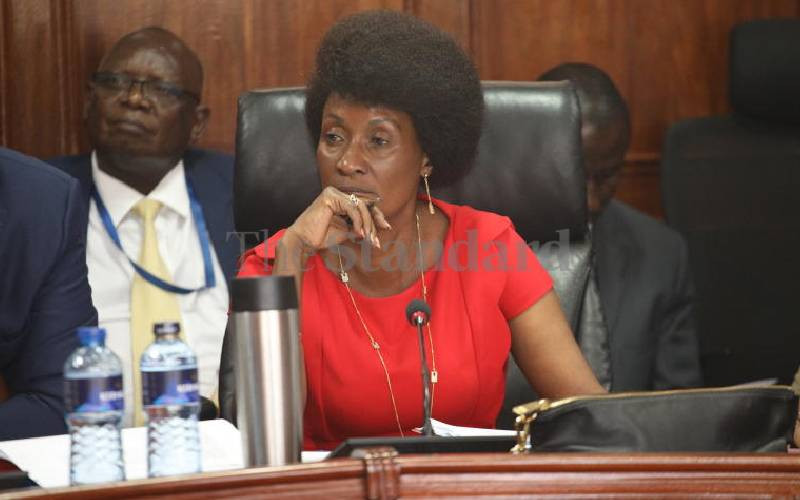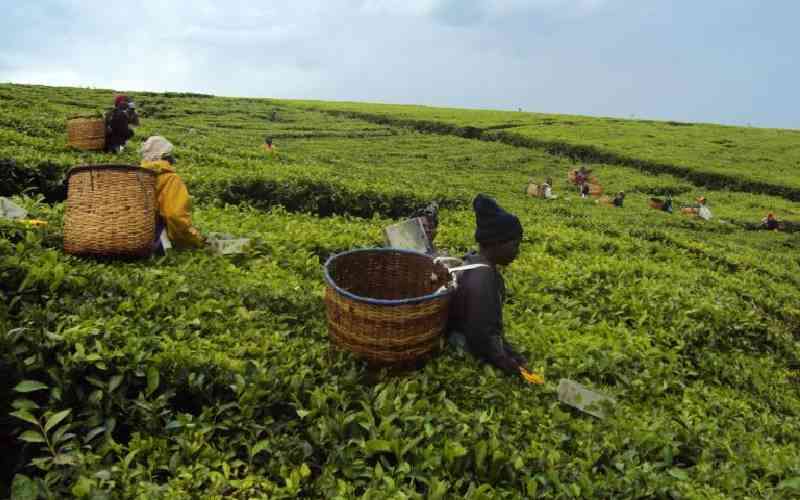Tea farmers continue to record a decline in second payment (bonus) earnings from the country’s leading cash crop.
According to a section of farmers who spoke to Smart Harvest in Nandi Hills, a region that predominantly produces tea, the crop was lucrative over the past ten to 15 years and if the government does not intervene, prices will continue to drop drastically.
“Some multinational tea firms declared second payment of Sh9 per kilogramme of green leaf last week. This is a drop compared to last year’s Sh 16,” says Mr Wilson Tuwei, Chairman of small scale tea farmers who supply the produce to multinational tea companies in Nandi Hills.
Despite the challenges, farmers have continued to soldier on in the production of the crop, which is the only source of livelihoods to thousands of families in Nandi as well as source of employment to more than 40,000 people.
Tuwei noted that the drop in bonus prices will spell doom to the economy of small scale farmers who rely on the leading foreign exchange earner to educate their children and for their families upkeep.
Transport costs
He said with the first payment of Sh20 and a declaration of Sh9 on second payment (bonus), farmers will earn a total of Sh29 per kilo compared to the previous year’s initial payment of Sh20 and a second payment of Sh 16 totalling Sh36 per kilo.
Mr Paul Mugun, a tea farmer and also a director in a farmers group said the second payment declaration was announced to farmers through their representatives last Wednesday in their zonal buying centres and that they are yet to receive the pay.
He said with the drop in the bonus earnings from Sh16 to Sh9, some farmers who acquired credit facilities from banking institutions will ‘get negative earnings from tea income’.
Tuwei and Mugun who spoke separately to Smartharvest said high cost of production still confront farmers.
They said apart from paying between Sh8 to Sh12 to tea pickers, farmers still incur expenses on transport and management costs, credit facilities from banking institutions and non-subsidised fertiliser for top dressing.
Mechanisation
They are in agreement that mechanisation of the sector would assist in reducing operational costs thus generating more income to small scale farmers.
“Kenyan tea is of high quality compared to other countries. Climatic conditions here are favourable and our tea is not affected by diseases hence there is no application of chemicals,” said Mugun.
He added: “Farmers are working hard to expand this sector and the government should intervene by reducing additional levies in the sector to enable farmers achieve good returns”.
Mugun also noted that brokers at Mombasa tea auction are to blame for poor earnings saying tea factories should be allowed to export the produce directly to the foreign market.
David Bor, a farmer said: “Tea used to be lucrative but production prices have drastically dropped over the last three years due to fluctuation in earnings”. Bor says the only option is to venture into the new variety of purple tea whose demand is higher in the world market.
“Purple tea is also medicinal and has a high demand that exceeds current production. There is need to establish processing factories for the new variety of purple tea to enable farmers expand its production,” said Bor.
Numerous levies in the tea sector have also been cited as part of the problem that has led to the dwindling teaprices.
During a recent interview in Eldoret, Nandi governor Dr Cleophas Lagat said tea farmers are the most frustrated lot due to poor prices with some contemplating at uprooting the cash crop due to declining earnings.
“There is need for an overhaul of the management of tea sector in the country. Farmers should get value for their investment in the sector,” said Lagat.
Stay informed. Subscribe to our newsletter
The governor claimed that there are about 19 levies in the tea sector, saying the ‘red tape’ should be removed to enable farmers realised good earnings.
“Of the 19 levies, we only know three genuine ones that include –the exchequer that goes to the government, cess for the maintenance of road infrastructure in tea producing regions and levies for tea research. Other levies should be removed,” said Lagat.
Value addition
The governor whose county is the third leader in tea production in the country after Bomet and Kericho regretted that some farmers are experiencing poor earnings.
“Some frustrated farmers now view tea production as a liability. We are asking them not to uproot the crop and an audit should be done in a view to addressing challenges that have affected earning in the sector,” said Lagat.
He added: “We need to liberalise the sector so that farmers can be empowered to do value addition and export their produce directly.”
 The Standard Group Plc is a
multi-media organization with investments in media platforms spanning newspaper
print operations, television, radio broadcasting, digital and online services. The
Standard Group is recognized as a leading multi-media house in Kenya with a key
influence in matters of national and international interest.
The Standard Group Plc is a
multi-media organization with investments in media platforms spanning newspaper
print operations, television, radio broadcasting, digital and online services. The
Standard Group is recognized as a leading multi-media house in Kenya with a key
influence in matters of national and international interest.
 The Standard Group Plc is a
multi-media organization with investments in media platforms spanning newspaper
print operations, television, radio broadcasting, digital and online services. The
Standard Group is recognized as a leading multi-media house in Kenya with a key
influence in matters of national and international interest.
The Standard Group Plc is a
multi-media organization with investments in media platforms spanning newspaper
print operations, television, radio broadcasting, digital and online services. The
Standard Group is recognized as a leading multi-media house in Kenya with a key
influence in matters of national and international interest.








